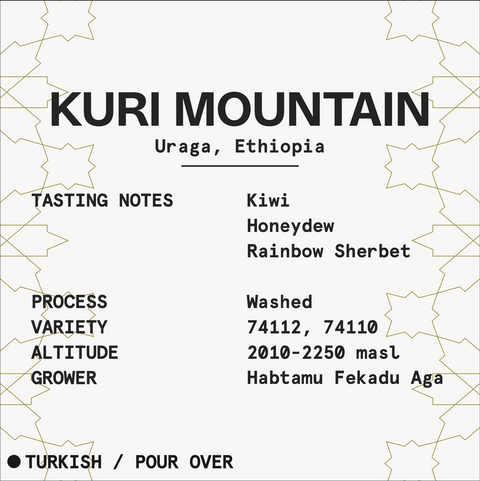

Kuri Mountain
Roaster Notes:
This vivacious coffee takes me back to my childhood indulging in mounds of rainbow sherbet. How can such sparkling acidity present atop such a creamy underbelly? You just have to ask Kuri Mountain. The Kuri experience begins with a very complex aroma of pistachio ice cream and orange starbursts inviting you in for a sip. The coffee first coats your tongue with a juicy kick of kiwi before rounding out into a slice of fresh honeydew. The body takes you to that creamy dream floating on clouds of that classic pink, orange, and green sherbet. The total slurp is the equivalent of sliding over a rainbow taking you on a trip through the Mountains of Ethiopia. We are so lucky to have this beautiful coffee on pour over as well as Turkish.
Importer Notes:
“The washing station was first built in 2013, after changing hands a few times was taken over by Habtamu Fekadu Aga in 2020. They have recently installed a Penagos pulping machine in 2022 helping create a more homogeneous lot. Currently the site has 7 permanent and more than 100 seasonal workers. The water supplied for the washing station comes from a deep gravel rock well. This washing station takes great care in ensuring that their waste water is not damaging the environment. They treat the waste water depending on the PH and once used they do not reintroduce the water into the natural surroundings.
This washing station uses a combination of machinery to sort, pulp and remove the mucilage. The final product of this is a bean with about ten percent mucilage left on it that is fermented for 24 hours before finally being handwashed and laid out to dry by the sun on beds for 9-12 days. The beans are not exposed to direct sunlight and every few hours the coffee is turned and inspected to ensure consistent drying. During these inspections the moisture content is measured and the beans are sorted for any remaining defects. The coffee is then bagged and stored.
900 tones of red cherries were being received annually and get 153 tones of parchment coffees. To ensure the quality of the lots there are two quality control managers, measuring moisture content and overseeing the timings of drying and fermentation.
There is a receipt for each transaction of cherry purchase. This is signed by the farmer whom has already registered with the washing station so that they may confirm the fact that this farmer is indeed from the correct region to contribute to the lot, and cosigned by multiple member of the team at the washing station to ensure transparency. Records are kept of these sales and of the change of ownership of the coffee once it leaves the premises.
There is basic agronomy education supplied to the farmers by the washing station. Explaining the importance of organic processes, shade growing the crops and regenerative crop suggestions. In addition to providing this training, the washing station is also involved with the renovation of the near by elementary school. often advance payment without interest to their farmers prior to harvest, as well as provide a service to collect the coffee.”
